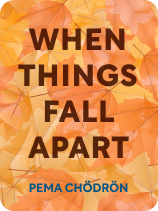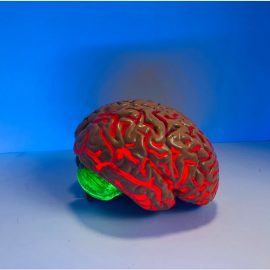

This article is an excerpt from the Shortform book guide to "When Things Fall Apart" by Pema Chödrön. Shortform has the world's best summaries and analyses of books you should be reading.
Like this article? Sign up for a free trial here.
How can you use your fear to your advantage? What’s Pema Chödrön’s advice on facing your fears?
In When Things Fall Apart by Pema Chödrön, fear is described as an emotion that you face head-on, not one that you run away from. If you want to live a life without your darkest fears, you need to confront them and experience them fully.
Let’s look at how turning toward fear will ultimately help you in the long run.
Turn Toward Fear, and Let Go of Hope
According to Pema Chödrön, fear is impossible to get rid of without turning toward it, experiencing it fully, and letting go of hope for an ideal life. Avoiding or covering up any negative emotion, including fear, only strengthens fear. And grasping onto hope for something better only makes us resist reality.
As you grapple with difficulty and uncertainty, you will inevitably experience longing for things to improve and fear that things will not improve or even worsen. One way to have a relationship with fear is to pause before you distract yourself from it or try to fix it. Instead, become familiar with how fear feels and don’t try to change it. Letting yourself feel your fear is an opportunity to learn more about yourself, become your own friend, be humble, and tap into your courage.
(Shortform note: Emotions, including uncomfortable ones like fear, are a natural and necessary part of the human experience. When we try to suppress or distract ourselves from them, we create a sense of inner conflict that can cause physical and mental health problems. Many psychology experts agree that avoiding or suppressing emotions is unhealthy because when we don’t process and release them in a healthy way, they can cause chronic and toxic stress responses in our bodies. Conversely, acknowledging and accepting our emotions can help to reduce stress, promote emotional well-being, and improve overall health.)
According to Chödrön, turning toward fear is helpful but not enough. To find true freedom from fear, you must rethink hope and let it go. She explains that hope—carrying a desire and vision for something better—can be just as detrimental to peace as fear because it keeps you from accepting reality and living in the present moment, where you can find all your wisdom and strength. Holding onto hope sets you up for disappointment and more suffering. However, when you release hope that pain and insecurity can be eliminated from your life, you’ll stop trying to achieve lasting security and comfort (which is unattainable) and gain the confidence to relax and accept uncertainty.
We tend to see hope as the antidote to fear. But Chödrön explains the people of Tibet see fear and hope as two sides of the same coin: They understand that the fear of loss and pain comes from having hope that circumstances can be ideal. The root of hope and fear are the false beliefs we have about reality—we feel we lack something, things are going wrong, suffering is unacceptable, and someone or something is to blame.
Cultivating mindfulness and compassion can help you turn toward fear and release hope. To build compassion for yourself and better understand your emotional responses, accept that fear and hope are natural responses to suffering. When we go through hard times, Chödrön believes there is an enormous possibility for renewal and positive change, but we overlook the potential in hardship because we are too attached to our false beliefs about suffering. Cultivate mindfulness and compassion and you will gain confidence in your ability to embrace reality with acceptance.
| Reframing Hope: Understanding the Buddhist Perspective on Letting Go of Desire For many, giving up hope to cope with difficult experiences will likely seem counterintuitive and counterproductive. This may be especially true if you are from a predominantly Christian country like the United States, as hope is one of the most cherished Christian values, along with love and virtue. Mental health research also shows the many benefits of having a hopeful and optimistic outlook, including living longer and avoiding many chronic health conditions. From this Western perspective, giving up hope in the face of adversity is a sign that you aren’t coping well and may need help. Therefore, the language that Chödrön and other Buddhist teachers use to discuss the benefits of giving up hope could be confusing. It may be helpful to think of the hope Chödrön talks about as desire—the desire for things to be different than they actually are—which is born out of our fear of suffering. Chödrön encourages us to let go of this form of desire (hope) which causes more suffering. Tara Brach approaches desire differently: She explains that the best way to relate to desire of any kind, including the desire for something to be different and better, is to be mindful of how desire feels, have compassion for our feelings, and radically accept them. |

———End of Preview———
Like what you just read? Read the rest of the world's best book summary and analysis of Pema Chödrön's "When Things Fall Apart" at Shortform.
Here's what you'll find in our full When Things Fall Apart summary:
- How to find courage and compassion amid pain, loss, and uncertainty
- How to use pain and suffering to grow and transform your life
- Buddhist methods for easing suffering and finding inner peace






